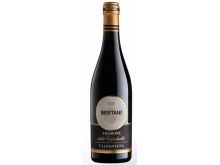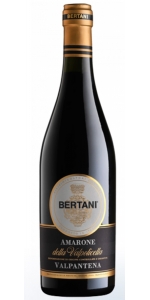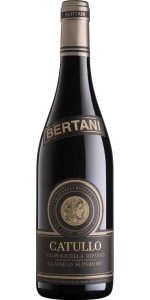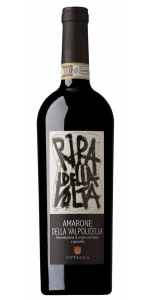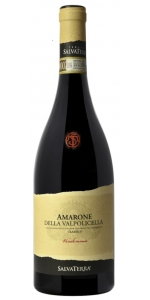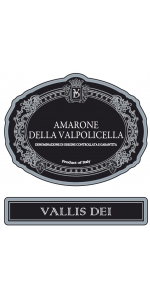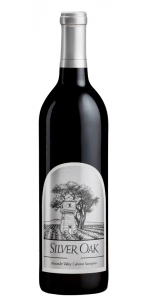Bertani Amarone della Valpolicella Valpantena 2020
Bertani Valpantena Amarone is made from 80% Corvina Veronese, 20% Rondinella.
The best grapes are selected so that only the healthiest and ripest bunches are sent to the drying rooms in the historic winery at Grezzana, where they are laid out in single-layer crates. In mid- January, the grapes are destemmed and crushed, then fermentation starts, at first at a temperature of 39°F- 41°F, which then reaches 72°F in the final stages.
WINEMAKING
The vines are vertical-trellised and Guyot-trained, with a planting density of 2024 plants per acre. Hand harvest is carried out in the middle of September.
This amarone is produced in the Valpantena hills, north of Verona. The soils are calcareous-marl in the east and calcareous-clay in the west, rich in iron.
TERROIR & VINTAGE NOTES
Bertani’s impact on Veneto wine making, particularly in Amarone production, is so considerable that ‘Bertani’ and ‘Amarone’ are nearly synonymous. Their 150+ year history is dotted with groundbreaking initiatives and royal accreditation. While respectful of their past, Bertani strives towards innovation, using progressive techniques and equipment allied with extensive experience and a deeply felt respect for tradition to provide wines of uncompromising quality.
On the nose, marked and intense aromas of very ripe cherries, sour cherries, spicy and nutty notes typical of the Valpantena. Good follow-through of red fruits on the palate, with supple tannins to give depth. This full bodied wine pairs well with rich dishes, mature cheeses and strong-flavored meats.
Bertani Valpolicella Ripasso Classico Superiore Catullo is made from 70% Corvina Veronese, 20% Corvinone, 10% Rondinella. Valpolicella Classica, Tenuta Novare Estate in Arbizzano di Negrar.
Wine of medium structure with elegant spicy notes of vanilla and chocolate accompanied by typical notes of cherry, sour cherry and white pepper. The palate offers the easy drinkability typical of Valpolicella and, at the same time, silky tannic structure and intense, prolonged aromatic persistence. The finish is fresh, soft and savory. A wine in the classic style, elegant, balanced, harmonious.
Review:
If I was forced to choose a number of wines that can steer the anachronistic Ripasso category into a brighter future, this would be among a very few. A mid-weighted, streamlined expression with just enough fruit on the bones. Think strawberries, lilacs, Asian plums, cloves and a hint of licorice. A noble, almost alpine bitterness lifts the finish. Brilliant. Drink or hold.
-James Suckling 95 Points
Ripa Della Volta Amarone della Valpolicella 70% Corvina, 20% Corvinone, 5% Oseleta and 5% Spigamonte.
The vineyards are located at an elevation of 300-600 metres above sea level, with a south-southwesterly exposure. Training system: Guyot.
It features an intense red color with garnet highlights. The nose offers up a rich variety of aromas with fruity notes of cherries, morello cherries and plums, spices and hints of chocolate. It is round and caressing with soft, mellow tannins balanced by excellent acidity that enhances its drinkability and ageing potential.
It is a wine with a marked personality, great finesse, elegance, and extraordinary longevity.
It pairs well with main dishes such as game and roasts, but also cured meats and mature cheese.
Review:
Strong, dark ruby with a light garnet edge. Intense and very clearly defined nose with notes of ripe plums, dark forest raspberries and some tobacco in the background. Round on the palate with plenty of supple tannin, pleasantly dry, firm pressure in the finish.
-Falstaff 92 Points
Salvaterra Amarone della Valpolicella Classico is made from 65% Corvina, 20% Corvinone, 10% Rondinella, 5% Oseleta.
Perfume of cherries, cocoa, tobacco and black pepper. On the palate it is complex and deep, elegant and robust at the same time, harmonious and with an excellent tannin.
Amarone della Valpolicella Classico is "the essence of the territory", structured but also fresh at the same time.
Pairs with red meats, aged cheese, dark chocolate, cigars.
Review:
Abundant lively red cherries, plums and mellow milk choolate with a energetic and powerful structure, an elegant frame of velvety tannins and an attractive balsamic finish.
-Decanter 96 Points
Cantina di Verona Amarone Valpolicella Vallis Dei is made from 65% Corvina Veronese, 30% Rondinella, 5% Molinara
Color: deep ruby red
Nose: Dried prune and blackberry with hints of vanilla and spice
Mouth: It is generously structured and velvety.
Yield: 8000 kg of grapes per hectar – after which the grapes are dried “appassimento”
Grapes are raisin-dried for at least 4 months after harvesting, losing at least 40% of their weight. It is made from selected grapes which are left to dry on racks in specially ventilated rooms until the end of winter.
Fermentation temperature between 18° and 22°C
Maceration time: 20 days
Silver Oak Alexander Valley Cabernet Sauvignon is made from 95.2% Cabernet Sauvignon, 2.5% Cabernet Franc, 1.9% Merlot, 0.4% Petit Verdot
The Silver Oak Alexander Valley Cabernet Sauvignon 2019 has notes of red cherry, raspberry, blackberry, iris, vanilla and clove. Ruby in color, this elegant wine has great acidity and lift on the mid-palate. Black currant and warm baking spices linger with a deep and fruity finish. It will provide drinking pleasure through 2047 given proper cellaring.
Review:
Silver Oak's 2020 releases of Napa and Alexander Valley Cabernets are downright impressive. Tasted four years after the fires, in September of 2024 at the Alexander Valley winery, neither wine showed any sign of the hardened tannic structure or overwrought fruit often associated with the vintage. Instead, these wines remain true to Silver Oak’s signature style, with blackcurrant, fig, and plum fruits layered with white pepper, sweet cedar, and coriander spice. Medium-bodied, with sculpted tannins that persist through the lengthy finish, the Alexander Valley Cabernet in particular retains all the hallmarks of a balanced, inviting, and vibrant Silver Oak red.
-Decanter 94 Points
Truly gorgeous, fruity, velvety and enjoyable for a full-bodied cabernet. It is rich in blueberries, cherry cream, black cherries and raspberries on the palate, with very smooth, layered tannins and a soothing mouthfeel. So easy to drink now, but it will age well, too.
-James Suckling 94 Points
Bertani Valpantena Amarone is made from 80% Corvina Veronese, 20% Rondinella.
The best grapes are selected so that only the healthiest and ripest bunches are sent to the drying rooms in the historic winery at Grezzana, where they are laid out in single-layer crates. In mid- January, the grapes are destemmed and crushed, then fermentation starts, at first at a temperature of 39°F- 41°F, which then reaches 72°F in the final stages.
WINEMAKING
The vines are vertical-trellised and Guyot-trained, with a planting density of 2024 plants per acre. Hand harvest is carried out in the middle of September.
This amarone is produced in the Valpantena hills, north of Verona. The soils are calcareous-marl in the east and calcareous-clay in the west, rich in iron.
TERROIR & VINTAGE NOTES
Bertani’s impact on Veneto wine making, particularly in Amarone production, is so considerable that ‘Bertani’ and ‘Amarone’ are nearly synonymous. Their 150+ year history is dotted with groundbreaking initiatives and royal accreditation. While respectful of their past, Bertani strives towards innovation, using progressive techniques and equipment allied with extensive experience and a deeply felt respect for tradition to provide wines of uncompromising quality.
On the nose, marked and intense aromas of very ripe cherries, sour cherries, spicy and nutty notes typical of the Valpantena. Good follow-through of red fruits on the palate, with supple tannins to give depth. This full bodied wine pairs well with rich dishes, mature cheeses and strong-flavored meats.
Bertani was founded in 1857 by brothers Gaetano and Giovan Battista Bertani. Prosperous wine merchants who believed that quality winemaking held the key to the future, the Bertanis invested their funds in buying some of the finest vineyards in the province and making their own wines. Consequently, unlike many other local producers, Bertani owns its own vineyards and so is able to oversee the entire winemaking cycle from start to finish. Recognition and success followed swiftly as Bertani became one of the first Veronese producers to export its wines on a significant scale. In the early years Bertani spearheaded a campaign to underscore the potential of Verona's Valpolicella Valpantena wine district. The release of its Secco-Bertani Valpantena brand, still in production over 150 years later, is responsible for putting this DOC on the map. The late 1950s saw Bertani take center stage again, with the launch of a new-style Recioto della Valpolicella. Through the introduction of longer aging techniques, this traditionally sweet or sparkling red wine was dramatically transformed into the dry, opulent red we know today as Amarone, one of Italy's most revered red wines. Recent years have been no less eventful. In 1986 an extraordinary cache of 1928 Recioto della Valpolicella Acinatico was discovered, bricked up behind the walls of a farmhouse on a Bertani estate where it had lain undisturbed since the twilight years of World War II. Tastings by experts confirm that the wine's quality remains intact. A superb vintage, as exceptional as it is rare, it is served exclusively at charity events hosted by Bertani. To maintain its extensive vineyards, Bertani engages the skills of some of Italy's most eminent viticulturalists. From its vineyards to its cellars, Bertani offers a fascinating and memorable introduction to Veronese winemaking at its best, where progressive techniques and equipment are allied with extensive experience and a deeply felt respect for tradition.
- back
Arzuaga Ladera del Norte Ribera del Duero is made from 100% Tempranillo.
The grapes come from organic crops and are harvested from the "Valdesardon" farm, owned by the Arzuaga Navarro family, which is the westernmost vineyard of the Ribera del Duero DO, located at an altitude of 800 meters in the village of Olivares de Duero. Clay-limestone soil on a hillside that will mark the characteristics of the wine.
The wine is of medium high intensity in color, a clear and bright cherry with purple flashes. An array of red fruits such as raspberry and cherry predominates with a high aromatic intensity, combining with balsamic tones, coffee and roasted notes coming from the aging in oak barrels without being overwhelming. This is a fresh and elegant wine, with an easy and balanced entry into the mouth followed by juicy and chewy sensations. Slightly sweet and toasted notes, and a pleasant and balanced aftertaste that is reminiscent of the fruity aromas on the nose.
Ideal companion for red meat, white meat, game and game, roasted or in sauce. Blue fish and soft cheeses.
Review:
"Intense cherry color. Aromas of dried herbs, creamy oak, black fruits and lactic notes. In the mouth, ripe fruits, spices, fine tannins, full-bodied."
- Penin 2022, 92 pts
Mas Redonne Tournier Bandol Luisa Jeanne is made from 95% Mourvedre and 5% Syrah.
The wine takes its name from a goddess, Luisa Jeanne. It has a deep red color with dark brick hues, a very intense and complex nose with strong sensations of dark fruit, compote, spice, earth and garrigue, with a minty touch. Palate intense, complex and silky, full and opulent with olfactive sensations and a slightly mineral saline aftertaste accompanied by rich but ripe tannins wrapped in a fruity robe. Approachable, long, harmonious, elegant.
Late manual harvesting of left grapes, their selection according to ripeness, harvesting parcel by parcel, variety by variety, separate vinification. Long fermentation with natural yeasts to oxygenate the must, gentle extraction of color and tannins, decanting and dipping of the matoline cap to absorb the tannins and make the wine silky and expressive. Aged for 18 months in old foudres.
A gastronomic wine for major occasions, ideal for red meat, game, charcuterie, cheese, chocolate and Provençal cuisine.
The wine takes its name from a goddess, Luisa Jeanne. It has a deep red color with dark brick hues, a very intense and complex nose with strong sensations of dark fruit, compote, spice, earth and garrigue, with a minty touch. Palate intense, complex and silky, full and opulent with olfactive sensations and a slightly mineral saline aftertaste accompanied by rich but ripe tannins wrapped in a fruity robe. Approachable, long, harmonious, elegant.

